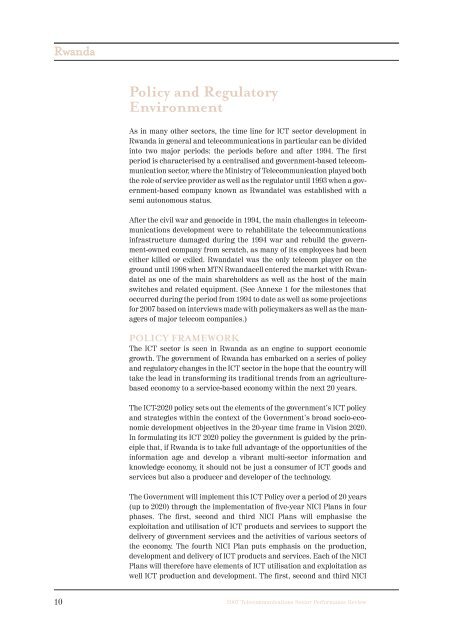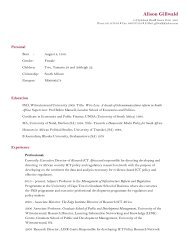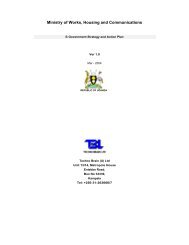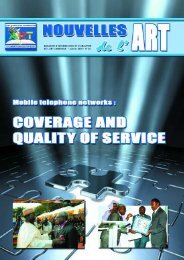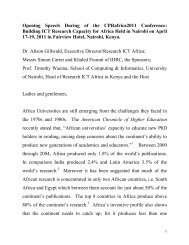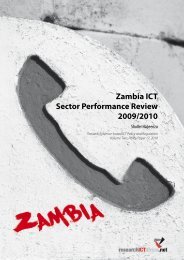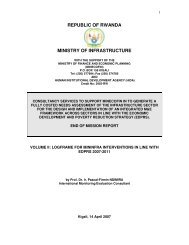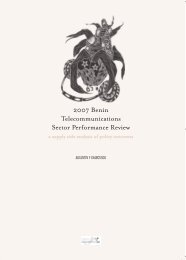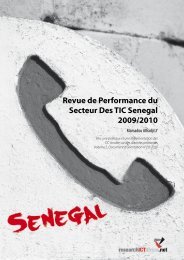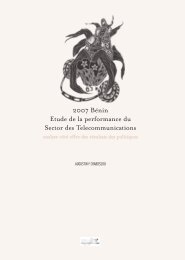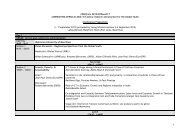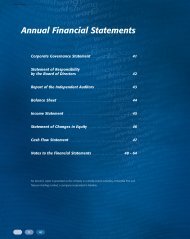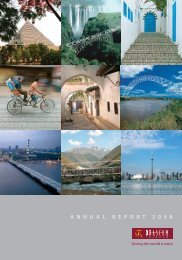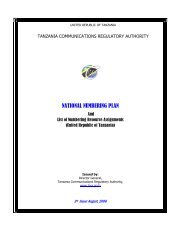Rwanda Telecommunications Sector Performance Review 2007
Rwanda Telecommunications Sector Performance Review 2007
Rwanda Telecommunications Sector Performance Review 2007
You also want an ePaper? Increase the reach of your titles
YUMPU automatically turns print PDFs into web optimized ePapers that Google loves.
<strong>Rwanda</strong><br />
Policy and Regulatory<br />
Environment<br />
As in many other sectors, the time line for ICT sector development in<br />
<strong>Rwanda</strong> in general and telecommunications in particular can be divided<br />
into two major periods: the periods before and after 1994. The first<br />
period is characterised by a centralised and government-based telecommunication<br />
sector, where the Ministry of Telecommunication played both<br />
the role of service provider as well as the regulator until 1993 when a government-based<br />
company known as <strong>Rwanda</strong>tel was established with a<br />
semi autonomous status.<br />
After the civil war and genocide in 1994, the main challenges in telecommunications<br />
development were to rehabilitate the telecommunications<br />
infrastructure damaged during the 1994 war and rebuild the government-owned<br />
company from scratch, as many of its employees had been<br />
either killed or exiled. <strong>Rwanda</strong>tel was the only telecom player on the<br />
ground until 1998 when MTN <strong>Rwanda</strong>cell entered the market with <strong>Rwanda</strong>tel<br />
as one of the main shareholders as well as the host of the main<br />
switches and related equipment. (See Annexe 1 for the milestones that<br />
occurred during the period from 1994 to date as well as some projections<br />
for <strong>2007</strong> based on interviews made with policymakers as well as the managers<br />
of major telecom companies.)<br />
POLICY FRAMEWORK<br />
The ICT sector is seen in <strong>Rwanda</strong> as an engine to support economic<br />
growth. The government of <strong>Rwanda</strong> has embarked on a series of policy<br />
and regulatory changes in the ICT sector in the hope that the country will<br />
take the lead in transforming its traditional trends from an agriculturebased<br />
economy to a service-based economy within the next 20 years.<br />
The ICT-2020 policy sets out the elements of the government’s ICT policy<br />
and strategies within the context of the Government’s broad socio-economic<br />
development objectives in the 20-year time frame in Vision 2020.<br />
In formulating its ICT 2020 policy the government is guided by the principle<br />
that, if <strong>Rwanda</strong> is to take full advantage of the opportunities of the<br />
information age and develop a vibrant multi-sector information and<br />
knowledge economy, it should not be just a consumer of ICT goods and<br />
services but also a producer and developer of the technology.<br />
The Government will implement this ICT Policy over a period of 20 years<br />
(up to 2020) through the implementation of five-year NICI Plans in four<br />
phases. The first, second and third NICI Plans will emphasise the<br />
exploitation and utilisation of ICT products and services to support the<br />
delivery of government services and the activities of various sectors of<br />
the economy. The fourth NICI Plan puts emphasis on the production,<br />
development and delivery of ICT products and services. Each of the NICI<br />
Plans will therefore have elements of ICT utilisation and exploitation as<br />
well ICT production and development. The first, second and third NICI<br />
10 <strong>2007</strong> <strong>Telecommunications</strong> <strong>Sector</strong> <strong>Performance</strong> <strong>Review</strong>


